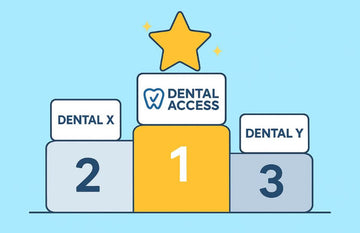Coffee is a beverage enjoyed around the world, and it's also delicious. Are you a coffee lover, but also concerned about the health of your teeth? This is a question many people ask, especially those seeking to maintain a bright and healthy smile. After all, coffee is known to stain teeth and even damage enamel. However, is this beloved beverage really a villain for your oral health?
In this blog, we'll explore the pros and cons of coffee consumption in relation to your dental health, as well as present some solutions to balance this relationship. So, get ready to find out if your morning coffee is a friend or foe to your smile.
The Health Benefits of Coffee.
Despite common concerns, coffee also has some surprising benefits beyond dental health. Let's start with them:
Helps with weight loss
Caffeine, present in coffee, helps control hunger temporarily, contributing to reduced food intake and consequently weight loss and weight maintenance.
Furthermore, coffee has thermogenic properties, slightly increasing energy expenditure and the burning of body fat, promoting weight loss.
Improves performance during physical activities
Caffeine, found in coffee, has ergogenic and analgesic properties that increase the body's energy production, reducing pain and physical fatigue, and improving exercise performance.
Improves memory and concentration
Who hasn't had a strong cup of coffee to wake up? Because it's rich in caffeine, a central nervous system stimulant, coffee helps increase alertness and memory, while also reducing drowsiness and increasing concentration.
Avoid depression
Coffee contains excellent amounts of polyphenols, which fight free radicals and reduce inflammation in the cells of the central nervous system, which helps reduce anxiety and improve mood, preventing depression.
Antibacterial Properties
Coffee contains compounds like caffeine and chlorogenic acid, which have antibacterial properties. These compounds can help fight harmful bacteria in the mouth, reducing the risk of cavities and periodontal disease.
Stimulation of Salivary Flow
Coffee consumption stimulates saliva production, which is essential for oral health. Saliva helps neutralize acids in the mouth, protecting tooth enamel and washing away food residue.
Halitosis Prevention
Coffee also has deodorizing properties, which can help combat bad breath. This is because the caffeine and other compounds in the beverage neutralize the sulfur compounds responsible for the unpleasant odor.
Reduced Risk of Oral Cancer
Some studies suggest that moderate coffee consumption may be associated with a lower incidence of oral cancer. This is partly due to the beverage's antioxidant properties, which may help protect oral cells.
The Difference Between Coffee with Sugar and Coffee Without Sugar
Now that we know some of the benefits of coffee for oral health, it's important to understand the difference between drinking coffee with sugar and coffee without sugar.
Coffee with Sugar
Sugar added to coffee can be harmful to your teeth. When sugar comes into contact with bacteria in your mouth, they produce acids that attack tooth enamel, leading to cavities and tooth stains.
Sugar-Free Coffee
On the other hand, unsweetened coffee is a much healthier option for your teeth. Without sugar, the drink doesn't stimulate acid production by bacteria, reducing the risk of cavities.
However, it's important to remember that coffee itself can still cause temporary staining on newly whitened teeth.
Types of Whitening Products Available at Dental Access
If you're a coffee lover but want to maintain a bright smile, Dental Access has a variety of teeth whitening products that can help combat stains caused by the drink.
Peroxide-Based Lighteners
Peroxide-based whiteners, such as hydrogen peroxide and carbamide peroxide, are highly effective in removing extrinsic stains, including those caused by coffee consumption.
These products can be used both in treatments performed in the dental office and in home treatments, under the guidance of a professional.
Let's understand the difference between carbamide peroxide and hydrogen peroxide, which are two substances commonly used in teeth whitening:
Hydrogen Peroxide :
Also known as hydrogen peroxide, hydrogen peroxide is a faster and stronger oxidizer.
When applied to teeth, it degrades into water and oxygen. However, it's important to note that during this process, slight and superficial demineralization of tooth enamel may occur.
Hydrogen peroxide is often used in short-term whitening treatments, such as those performed in dental offices.
Carbamide Peroxide :
Carbamide peroxide is more stable than hydrogen peroxide.
It's bound to urea and, when degraded, releases hydrogen peroxide. Furthermore, the urea present in the process helps maintain a neutral pH, reducing the possibility of mineral loss in the teeth.
Carbamide peroxide is often used in at-home whitening with custom trays, being a minimally invasive and effective option.
How to Balance Coffee Consumption After Whitening
After whitening treatment, it's natural to want to keep your smile bright. However, coffee consumption can be a challenge. Fortunately, there are some strategies that can help balance this relationship:
Drink Coffee with a Straw
Using a straw when drinking coffee can help minimize contact between the beverage and your teeth, reducing the risk of staining.
Rinse your mouth with water after consumption
After drinking coffee, rinse your mouth with clean water. This will help remove coffee residue and neutralize the acids in your mouth.
Brush your teeth after consumption
Whenever possible, brush your teeth after drinking coffee. This will help remove any residue from the drink and maintain oral hygiene.
Consider Lighter Coffee Options
Opt for lighter coffees, such as latte or cappuccino, which tend to stain teeth less than black coffee.
Maintain Good Oral Hygiene
In addition to taking specific precautions when consuming coffee, it is essential to maintain good daily oral hygiene, including brushing, flossing, and regular visits to the dentist.
By balancing your coffee consumption and adopting these strategies, you can enjoy this beloved beverage without compromising the health and appearance of your teeth.
So, what do you think? Is coffee a friend or foe to your smile? We hope this blog has helped clarify this question and provided valuable tips for maintaining a healthy, bright smile, even if you're a coffee lover.










